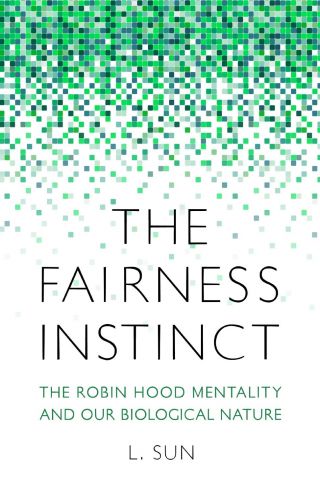Environment
The Fairness Instinct: Science, Human Nature, and Sociality
In "The Fairness Instinct" L. Sun argues that fairness is a DNA-based emotion
Posted October 6, 2013
Pursued by all major philosophers and social thinkers for millennia, fairness is an issue that has never gone out of fashion. With science joining the fray in recent years, the quest for fairness has vastly expanded, embracing disciplines traditionally considered marginal for the topic, including economics, biology, psychology, neuroscience, anthropology, and sociology. These exciting new developments, meanwhile, force us to face two pressing problems: how to integrate information amassed in different fields and how to communicate among scholars speaking different technical languages. Fortunately, L. Sun has made a timely effort in filling these voids with his new wide-ranging and interdisciplinary book, The Fairness Instinct: The Robin Hood Mentality and Our Biological Nature.

In this highly readable and well-written book, Sun identifies two major selective forces behind the origin and evolution of the fairness instinct in humans: the need for perpetuating trade in the biological market as a generalized form of cooperation and the bottom-up pressure for resourcesharing in social hierarchies. Under this overarching evolutionary framework, he synthesizes a diverse body of academic literature and finds a unified theme underlying a motley collection of disparate social phenomena—cooperation, envy, consumerism, anti-intellectualism, revenge, revolution, terrorism, monogamy, religion. Enmeshing engaging stories with in-depth analysis, Sun walks readers to the conclusion that fairness is a human instinct that underpins a large and varied spectrum of our actions. It is not, as is traditionally supposed, a purely ideological issue; it is emotion and behavior rooted in our DNA. Notably, Sun bolsters his evolutionary rationale using several recent studies in empathy and morality in non-human animals and enriched the connotation of "wild justice" coined in the book by me and Jessica Pierce called Wild Justice: The Moral Lives of Animals.
While marshaling evidence in driving home his arguments, Sun is constantly mindful of his book’s new insights into a range of practical issues in our private lives and in hotly debated public affairs. As the fairness instinct continues to underpin, fuel, and transform the developments of on-going domestic and international events, more than ever, we need a clear understanding of what the biological impulses behind the current economic, social, and political conundrums are and how they are linked to our views, preferences, and actions. In the end, readers are left with a reverberating take-home message: our fairness instinct is much more potent, profound, and pervasive than many of us have so far understood. In this respect, science can contribute much, much more to the everlasting issue of fairness.
Note: A recent essay in the New York Times called "Are We Hard-Wired for War?" by the University of Washington's David Barash will also be of interest to those who want to know more about the importance of fairness and cooperation.


